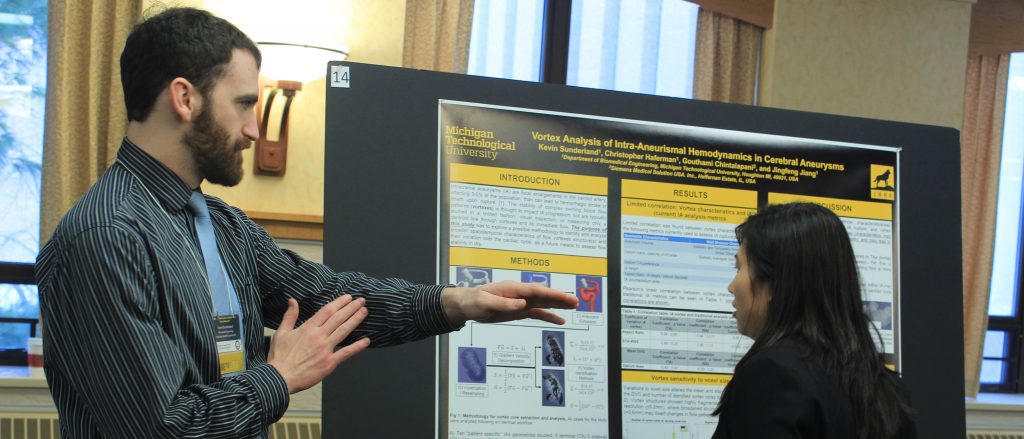Each spring at Michigan Tech, the Graduate Student Government sponsors the Graduate Research Colloquium Poster and Presentation Competition. The colloquium is held in the Memorial Union Ballroom and saw nearly 50 Michigan Tech graduate students present this year between Wednesday, Feb. 15 and Thursday, Feb. 16.
The competition was open to all graduate students from any department, with a broad range of categories like Arts and Humanities, Power and Energy, and Advances in Medicine. Graduate students who participated in the colloquium could choose to present their research in a talk or a poster describing their work, with both posters and presentations being judged by Michigan Tech faculty with predefined rubrics. “The colloquium is a semi-formal opportunity to share ongoing research projects, they can be related to a student’s dissertation of just part of a student’s coursework,” said Sarah Potter, a first year doctoral student and faculty member at Northern Michigan University.
Potter presented in MUB Ballroom B3 on Thursday and was one of just two Arts and Humanities presenters. Her presentation was titled “Using Critical Discourse Analysis to Understand Power, Hegemony, and Blame in the Stanford Rape Case,” and looked at the wording used in Brock Turner’s statement versus the wording used in the victim’s statement, also described by Potter as the “lexical choices.”
Potter explained that work presented at the colloquium can vary in the amount of time a student puts towards it: it can be a semester-long project, a one-time term paper, a four-semester dissertation paper, or even something that the student is working on publishing. “The colloquium is a way for graduate students to get practice presenting in a supportive environment where it’s safe to make mistakes, and it’s great for getting helpful feedback,” Potter said.
The colloquium is the Graduate Student Government’s largest event of the year, and along with showcasing the variety of research going on at Michigan Tech, the event included three “Author’s Coffee” sessions (one on Wednesday and two on Thursday), where presenters were able to discuss their research with one another in a more casual setting. A networking social was also held on Wednesday right after the poster presentation session and included networking bingo and a raffle to incentivize interactions. “The Author’s Coffees and networking social were intended to be a less formal setting for graduate students, faculty, and community members to interact with each other,” said Tyler Capek, GSG Academic Committee Chair.
On Thursday night, all presenters, award nominees and the graduate school’s award winners were invited to an awards banquet to congratulate the graduate students and faculty who received awards. Awards included cash prizes for the top three oral and poster presentations, as well as three “Graduate School Awards” and four “Graduate Student Merit Awards.”





